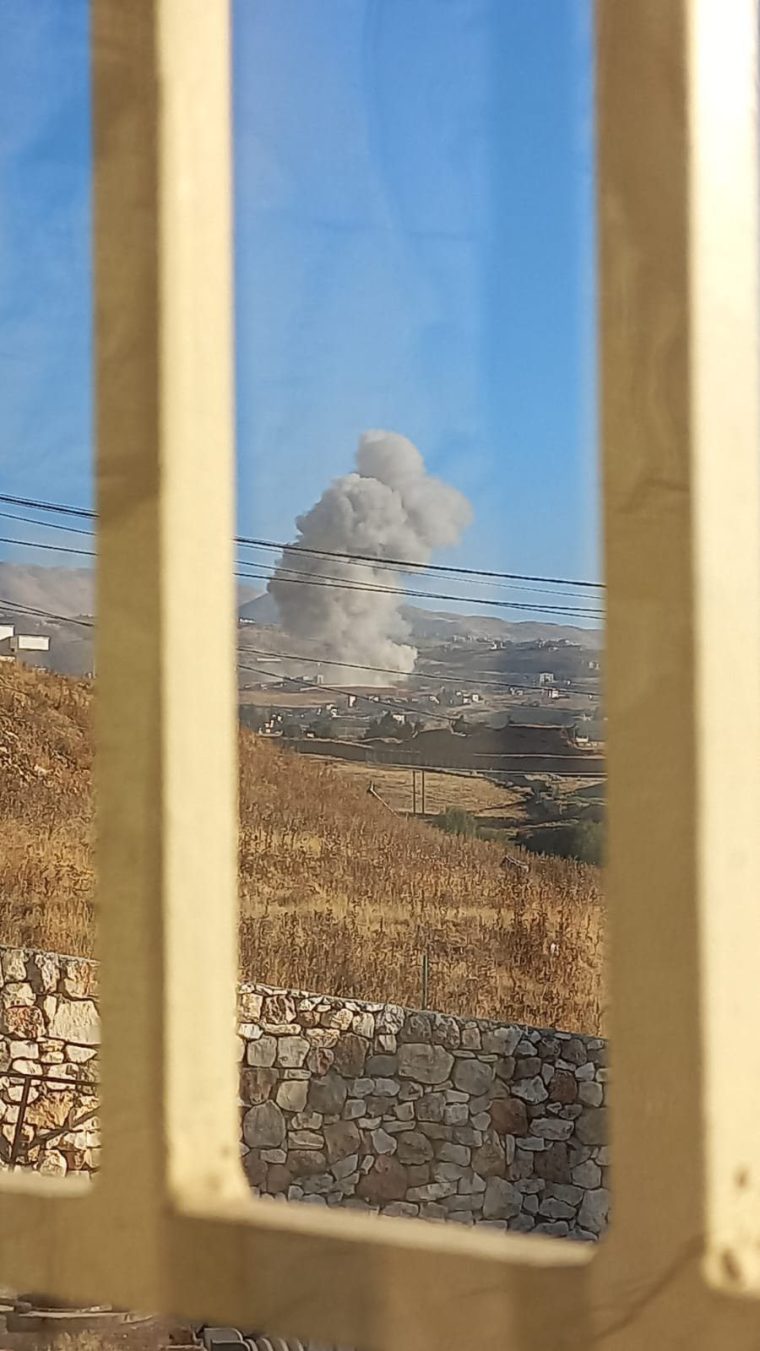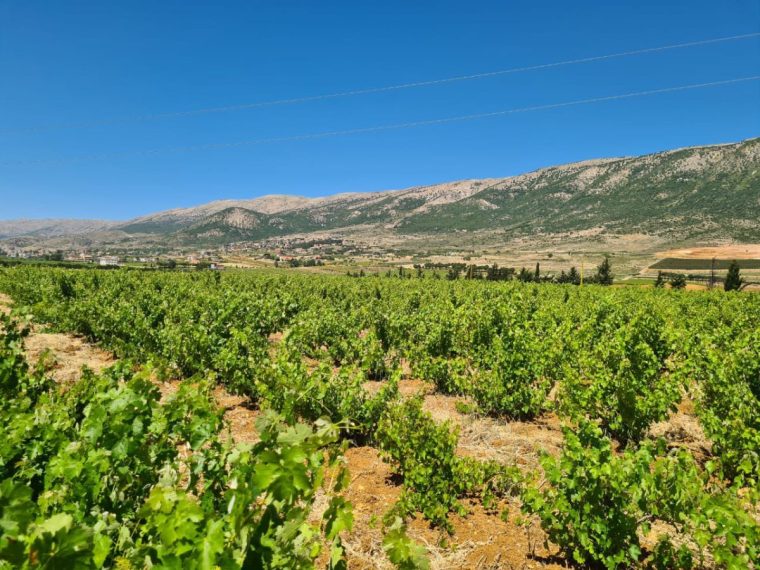Faouzi Issa was in his laboratory when the missile struck.
“F**k, it’s getting closer to us,” he thought, as he photographed the billowing smoke, less than a mile away. Thirty minutes later, he was back at work.
“I forgot, to be honest. I was too taken by the job,” the owner and winemaker of Domaine des Tourelles told i as he sighed. “There is something bad in me that I can forget about the risk.”
Such is the challenge of farming Lebanon’s fertile Bekaa valley, about 20 miles east of Beirut, which has been subject to Israeli bombardment in recent weeks in the war between Israel and Hezbollah.

The region is home to some of Lebanon’s most famous wines and contributes the majority of the approximately 11 million bottles produced in the country each year.
But as Israel ramped up attacks on Hezbollah in vast swathes of the valley, some of the country’s vaunted winemaking has recently come under threat.
Domestic sales have plummeted sharply and workers have been reluctant to help with the annual harvest, as many residents have been killed or wounded. Thousands fled the region and the impact of the recent ceasefire, signed on Tuesday, remains unclear.
“There is anxiety… because I have small kids and the business is going down day after day,” Issa said.
Lebanon’s wine industry is thousands of years old, dating back to the Phoenician period. The country grows international grape varieties such as Cabernet Sauvignon, Merlot, Syrah, Grenache and Carignan, as well as the indigenous white grapes of Obeidah and Merwah. About half of the wine produced by the country is exported internationally.
“We are working to a high standard…. We are very well recognised in Lebanon and in the international market,” says Micheline Touma, president of the Union Vinicole du Liban, Lebanon’s official associate of wine producers.
Typically running from mid-August to mid-October, winemakers were fortunate to have an earlier harvest than normal this year.
By the time Israeli attacks on the Bekaa intensified in October, most were already well into gathering their grapes. But as the bombing began, hiring people to continue picking became difficult.
Wineries in the Bekaa valley often rely on Syrian employees for the harvest, and many, with their own experience of war, fled home to escape the violence. Over 300,000 Syrian refugees were living in the Bekaa at the beginning of 2023, according to the UN refugee agency.
“We had a lot of challenges, especially motivating the staff to come to the winery,” Issa said. “The staff thought that I might skip coming to work because of the situation, but I was the first one to come to the winery every day from Beirut.”
The risk, many winemakers agree, came from travelling to and from the remote vineyards, where people are exposed to a higher likelihood of driving near targeted Hezbollah members.
“If [a bomb] lands next to you, you will be collateral damage,” said Tarek Sakr, the winemaker at Chateau Musar, also located there.
“The night after a big bombardment in the Bekaa valley. I have, to be honest with you, I just hesitated, but I said, if I hesitate, it will be more difficult on the second day…. Nobody was on the roads.”

A devastating airstrike
No winemaker appears to have been as badly affected as Elias Maalouf, owner of the Chateau Rayak winery.
In September, a missile landed on what Maalouf says he discovered to have been a secret Hezbollah base by the gates of his estate. Already struggling from a depressed tourism season, from which Chateau Rayak uniquely makes the majority of its profits, the winery’s entire harvest was destroyed.
“We lost a whole season… More than 60 tonnes of grapes,” Maalouf told i. “In just a few seconds, something that we never believed [possible], happened to us.”

Maalouf is repairing the damage to his roof and windows to shield against the coming winter. Despite the ongoing risk, he said he won’t leave his estate, fearing it may be used by displaced people for squatting. Over a million people have been forced to leave their homes in Lebanon, according to the UN.
“We are guarding our wineries, our place, because we’re afraid that someone will steal our property,” he says. “We don’t know if we’re gonna be hit again, so we can’t invest much more in restoration but we [will] try to restore as much as we can.”
The domestic market has also been dealt a severe blow. The lack of tourism, usually a driver for winery visits and restaurant demand, has weighed heavily on the sector.
“During Christmas, people will drink wine, definitely, but sales have decreased dramatically,” Touma said.
“I don’t want to tell you it’s zero, but it’s near zero,” adds Sakr. “Nobody has neither the pleasure, nor the audacity, to go and celebrate.”
To address this, winemakers are turning to the international market. Touma says that the union is doing its best to help promote added wine exports, taking advantage of the country’s still-operating ports.
“Whenever there’s a crisis in Lebanon, you feel that the diaspora or international clients [want to help],” Touma said.
“We encourage our distributors, everyone, to increase their export from Lebanon. Whoever used to take, let’s say a container, or half a container, [we want them to increase] it to a full container so we can sell as much as we can. You never know when something will happen to the airport or the port.”
“You can’t believe the support we’re getting,” echoes Issa. “The top markets, like the UK, Norway, Sweden, United States, Iraq and Dubai – these are solid markets where everyone cares about our continuity.”
Sakr has also noticed an increase in sales from abroad.
“We are seeing it on our social media… They are taking pictures of their Chateau Musar and saying ‘Cheers for Lebanon. We are thinking about you’, which really is very touching and heartbreaking.”
This is the third war that Sakr says Chateau Musar have been through.
The winery continued to harvest grapes under duress during the country’s civil war and again during the 2006 Israel-Hezbollah war. In 1984, one harvest, travelling a circuitous route through the country’s mountains to avoid fighting, started to ferment in the truck and was never sold. But decades later the wine impressed in a sommelier tasting in the US.
“‘[The 1984 vintage] is a story of faith – of insisting on doing wine against all odds,” Sakr says. “Making wine for us is not about making money. It’s our way of life. We cannot stop our way of life, or we will be finished.”
It has become a tedious refrain in the country to speak of Lebanese resilience, that time and again, the country has been able to bounce back from its many setbacks. Many Lebanese say they are fed up with being called resilient, that they just want to live an ordinary life. Without a doubt, the country is currently going through one of its toughest moments. And yet, winemakers are defiant that there is cause for optimism.
“Life goes on. Even if there is a war, this is part of the series that Lebanon is being hit [with]. Starting with COVID, inflation, the port explosion and now this mega war,” said Issa.
“I don’t think there’s something that can stop our energy in finding a solution and a path forward.”



'President Musk' is flexing his muscles and revealing how weak Trump is